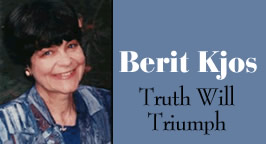Related
Articles:
Other Kjos Articles:
Spirit-Led
Or Purpose
Driven? Part 1
Spirit-Led or
Purpose
Driven? Part 2
Spirit-Led
Or Purpose
Driven? Part 3
Spirit-Led
Or Purpose
Driven? Part 4
Spirit-Led or Purpose
Driven? Part 5
Harry Potter And The Chamber of Secrets
Part 1
Hegelian Alchemy And
Mind Changing Games
Part 2
Pagan Fantasies Join The Digital Explosion
Part 3
The Global Message Behind Mystical
Thrills
MEL GIBSON'S "PASSION"
By Berit Kjos
February 25, 2004
NewsWithViews.com
Jody Dean, a CBS News anchor, shared his "Perspective on 'The Passion of the Christ' in an article posted at Religion Today:
"This is not a movie that anyone will 'like'.... It certainly doesn't 'entertain'. There isn't even the sense that one has just watched a movie. What it is� an experience -- on a level of primary emotion that is scarcely comprehensible. Every shred of human preconception or predisposition is utterly stripped away.... Quite honestly, I wanted to vomit. It hits that hard.
"The film grabs you in the first five seconds, and never lets go. The brutality, humiliation, and gore are almost inconceivable - and still probably does not go far enough. The scourging alone seems to never end, and you cringe at the sound and splatter of every blow - no matter how steely your nerves."[1]
It "grabs you," said Jody Dean. Of course! That's part of the persuasive power of a well-made film. It fills our minds and imagination with images that often impact us far more than facts or truth. Educational change agents know that well. That's why they use shocking stories to evoke the strong feelings needed to implant new values into the minds of our children. Whether imagined or real, events and stories that stir strong emotions build convincing mental models.
How might the intense emotional experience of such raging brutality affect viewers -- especially children and youth already immersed in violent "entertainment"? Will it further desensitize them or alter the foundation for their faith?
When people are caught up in the emotional plot of The Passion, all the extra-biblical additions -- including each step along the Catholic "Stations of the Cross" -- become as real to the viewer's virtual experience as the factual (but less detailed and dramatic) message in the four gospels.
Do you wonder what kind of gospel will be stamped on our minds after this emotional experience? Tom Carter, President of CAP Ministry at cap@capalert.com helps us answer that question. After watching a pre-release private screening, he wrote these observations:
"Many clever devices were used to express thoughts and ideas. One was when Christ was on the cross, the camera's field of view of Golgotha with Jesus on the Cross was shrunk, taken up into the clouds then fell back to earth as a raindrop, expressing a tear of God. Another was displayed as Satan and his hold over death and sin was defeated by the death of Jesus. Satan was figuratively dragged down to Hell, crumpled and bankrupt of his due through the sins of mankind.... Another clever device was how, when God caused the veil of the temple of Herod to be split in two, top to bottom, that Gibson had the throne split in two as well.... But I'll not argue the details. It was a nice poetic touch, Mel. Besides, who is to say the throne did not rent?[2]
God didn't say it did! Who, then, are we to tell or promote a different story?
"Gibson's film is an intensely Catholic account of the Passion," wrote Linda Chavez in her article, "Mel Gibson's Film Inspires Soul-Searching." She continued,
"Indeed most of the scenes depicting Christ's journey along the Via Dolorosa on the way to Golgotha seem inspired by the Catholic devotional ritual the 'Stations of the Cross,' which dates back to the 14th century. A scene in the film depicting Jesus' encounter with Veronica, who wipes his face and is left with Christ's image on her veil, is part of Catholic tradition....
"The only characters who come off as demented sadists are the Roman soldiers who torture Christ after Pilate orders him beaten -- and these truly seem to be possessed of the Devil, who appears as a specter-like character throughout the film."[3]
But the Roman soldiers were just following orders. They bore no grudge against Jesus. He was no threat to them. Why would they show such inhuman brutality? In contrast, Jesus was a real threat to the prestige and teaching of the Pharisees. That's why most of them despised Him. Yet, that's no reason to call the gospel anti-semitic. After all, Jesus, his disciples and most of his other friends were all Jews.
The point is, does the movie imprint a true story in our memory, or does it distort the Biblical account under the banner of truth and evangelism?
Consider another example from the article, "Witness to the Passion," by Lindy Warren. She wrote,
"The ominous figure taunting Christ in the garden of Gethsemane shows up throughout the movie, personifying Satan and portraying the spiritual battle being waged, culminating in Christ�s last hours. Poignant flashback scenes from Christ�s life illustrate... Mary�s love and anguish for her son.
"The film is 'substantially accurate,' says Darrell Bock, professor of New Testament Studies at Dallas Theological Seminary...."[4]
"Substantially accurate?" Does he mean most of it is true, while only a small part is untrue? What would be his measurement for truth? Or for a deceptive half-truth? Unlike our pragmatic and relative human standards, God's unchanging Word is absolutely true. When we bend or expand it to fit our "needs" or wants, it's no longer true. That's why the Bible warns us that "if anyone preaches any other gospel to you than what you have received, let him be accursed.? For do I now persuade men, or God? Or do I seek to please men?" Galatians 1:6-10
The apostle Paul gave another illustration of man's lukewarm attitude toward truth: "?If he who comes preaches another Jesus whom we have not preached, or if you receive a different spirit which you have not received, or a different gospel which you have not accepted�you may well put up with it!" (2 Corinthians 11:4) That sounds like the church today, doesn't it? We forget God's command: "Do not add to His words, lest He rebuke you, and you be found a liar." Proverbs 30:5-6
"The film is part gospel story and part myth with a generous amount of Hollywood and violence thrown in," said Eric Shafer, director of communications for the Evangelical Lutheran Church in America (ELCA), who saw the movie at a private showing near Chicago. "Much has been added to the gospel story to fill in the gaps."[5]
In light of the strong Catholic influence, one might wonder what Mel Gibson himself believes. In his article, "The Jesus War: Mel Gibson & "The Passion," Peter J. Boyer gave us the following glimpse:
"I told Gibson that I am a Protestant, and asked whether his pre-Vatican II world view disqualified me from eternal salvation.
"He paused. 'There is no salvation for those outside the Church,' he said. 'I believe it.' He explained, 'Put it this way. My wife is a saint. She's a much better person than I am. Honestly. She's, like, Episcopalian, Church of England. She prays, she believes in God, she knows Jesus, she believes in that stuff. And it's just not fair if she doesn't make it, she's better than I am. But that is a pronouncement from the chair. I go with it."[6]
Apparently Mel Gibson's beliefs have changed since that interview last September. During his more recent televised appearance on ABC (February 16), Diane Sawyer raised a question about a scene in the movie. In the Biblical account, Simon of Cyrene is recruited to carry the cross for Jesus. (Mark 15:21) But in movie, Simon "interlocks arms with the bloody Jesus as they struggle to take the cross." Why?
"It's his brother," explained Mr. Gibson. "It's about another human being. We're all children of God. All of us! It doesn't matter what you are -- whether you've got a bone through your nose or whether you look like a Viking.... or whatever you are. We are all children of God."
That sounds like universalism! Did he really mean that? A little later, Diane Sawyer asked him about his traditional form of Roman Catholicism, which opposed Vatican reforms such as "more inclusion of other faiths." Would Gibson's traditionalist views shut heaven's door to Jews, Protestants and Muslims?
"That's not the case at all," answered Gibson. "Absolutely not! It is possible for people who are not even Christian to get into the Kingdom of heaven. It's just easier for -- and I have to say this because it's what I believe...."
"You have a nonstop ticket?" interrupted Sawyer.
"Well, yeah, I'm saying it's an easier ride. I have to believe that."
Mel Gibson's understanding of God
and His gospel laid the foundation for this movie. One of his key sources
of inspiration was the 18th century mystic, Anna Katharina Emmerich.
Author Michael Brown gives us some glimpses of her life. They remind
me of the enticing visions described in Embraced by the Light, the bestseller
by Betty Eadie, who blended her Mormon faith with Native American spiritism.
Like Anne Emmerich and several Native American "medicine" men, Betty
Eadie's visions began early in life. For more details see Deliver
us from Evil
Ponder this statement:
"While newspapers focus on the vivid portrayals of Christ's Crucifixion... and the controversy with Jews... there is a hidden, mystical element, and that's the charisma attached to the stigmatic whose revelations contributed significantly to the film.... The mystic is Anne Catherine Emmerich.... [R]eading her revelations leaves one feeling that he has undergone an 'unusual influence' -- similar to what is now reported with those who see the movie.... It's no surprise that the movie's director, Mel Gibson, is said to carry one of her relics."[7]
It's true. Gibson pulled the relic out of his pocket and showed it to Diane Sawyer during the ABC interview. In fact, as "Christianity" is becoming increasingly postmodern, mystical and universal, we see a return of timeless relics, amulets, icons and charms. Gibson's marketing schemes will surely speed the process. Already, "replicas of the nails used to hang Jesus on the cross have become the red-hot official merchandise.... Hundreds of stores across the country will be selling licensed items tied to the movie.... The souvenirs include a book, pins, key chains, coffee mugs and T-shirts....'The response so far has been overwhelming.'"[8]
Are you concerned, as I am, about deception in the Church and deviation from God's written Word? Then you might like to remember the words of a nineteenth century missions leader, Rev. E. K. Alden:
"One of the religious perils of the hour is the failure of many good men to discern the peril. There is sometimes a drift toward error which is gradual and almost imperceptible, and yet may be so steady and strong that the trend of a man's influence is toward error, although he is continuously advocating the truth.... If a person is known to hold a serious error, even though he may seldom or never directly advocate it, that fact that he is known to hold the error will possibly neutralize all his fervid utterances of the truth.... Indeed, there are times when the exclusive advocacy of certain important truths has the effect of error."[9]
Footnotes:
1.
1. Jody Dean, "Perspective on 'The
Passion of the Christ," Religion Today
2.
Tom Carden, February 2004. cap@capalert.com
3.
Linda Chavez, "Mel
Gibson's Film Inspires Soul-Searching
4.
Lindy Warren, "Witness
to the Passion"
5.
Martha Sawyer Allen, "Mel
Gibson's reel leap of faith," Star Tribune, February 21, 2004.
6.
Peter J. Boyer, "The
Jesus War: Mel Gibson & 'The Passion'," The New Yorker, September
15, 2003.
7.
Arthur Brown, "Behind
film endorsed by both Catholics and Protestants is a stigmatic whose
life and revelations continue to amaze" For more information, see
Catholic Mystics
8.
William Neuman, "'Jesus'
Nail Sale," New York Post, February 19, 2004.
9.
From a letter written by the Rev. E. K. Alden, D.D., Home
Secretary of the American Board of Foreign Missions, Boston, March
21, 1887.
For more answer to your questions about Mel Gibson's Passion, please read the full-length article.
Berit Kjos is a widely respected researcher, writer and conference speaker. A frequent guest on national radio and television programs, Kjos has been interviewed on Point of View (Marlin Maddoux), The 700 Club, Bible Answer Man, Beverly LaHaye Live, Crosstalk and Family Radio Network. She has also been a guest on "Talk Back Live" (CNN) and other secular radio and TV networks. Her last two books are A Twist of Faith and Brave New Schools. Kjos Ministries Web Site: http://www.crossroad.to/index.html
"It "grabs you," said Jody Dean. Of course! That's part of the persuasive power of a well-made film. It fills our minds and imagination with images that often impact us far more than facts or truth."






